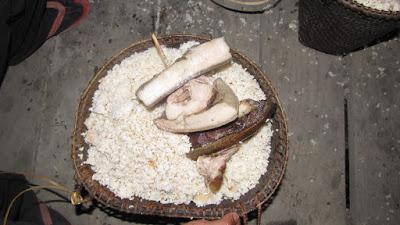23rd May 2015
Solung, mana and the pig
Two days later, we had the Solung festival yesterday and today and tomorrow are Mana (holidays) days. The Mana days need a special mention. For a third or more field work days in Bomdo village, there has been Mana, which basically means that no one is allowed to work; compulsory holidays, what a lovely practical concept! These are the days reserved for merry, rest and spirited conversations. There have been many occasions when Roy and I have loads of field work but it can't be done because of Mana. In the Adi language, it is called Gena. Coupled with unpredictable rain spattered across nine of the twelve months of a year, Mana has been a crucial factor dictating how much work can be done in a field season (usually from October to May).
Solung festival. Three Mithuns (Bos frontalis) and several pigs were sacrificed during the festival. A couple of years back, I had spent time in a few households during the festival and by the end of it, I had had enough millet beer to have donated my slippers to someone and only later realised I walked around the village barefeet all day! this year, I decided to spend my time with my friend Takkar, he was cutting a pig himself, not bothered much with what else was going on in the village, he was celebrating personal Solung, he said.
A male pig from the Egin, the toilet. Takkar had already killed the pig by strangling it with two bamboo boles buried into the ground and tied up together tight about a meter above the ground with the pigs neck in between. The pig stays alive a while, refusing to give up; few minutes in between when it tries to take a world of air but manages a little and slowly dies of asphyxiation. The pig was reared for this day, this moment...four years of living in a dingy toilet for a day to see the sun and die. The world is an unfair place, but perceptions concord with only a fraction of the larger scheme of things, I let the thought fade.
I help Takkar burn off the skin hair on a small dried-palm-leaf fire. We turn the pig around and round and scrape the burnt hair off with a palm tree branch till its ready for the 'operation' as Takkar calls it. Takkar turns the pig around over its back and cuts open a portion around the belly. The small reverse-curved knife, the chigdo cuts it as smooth as a knife would a pastry and belly fat floats up. When you look at it, it seems improbable that an animal stores that much fat, but that was the reason it was kept in a 3 x 3 m enclosure; so it does not expend energy moving around. So the fat stored can be transferred up the trophic state to another being to sustain the energy required to be an Adi; to farm, to hunt, to walk miles and miles in the mountains and valleys around the village, not just a culinary detail.
Beyond the belly fat, the Yakdin, considered medicinal and stored for long periods, lie the visceral organs. Takkar pulls them out one by one, the intestines first, next the lungs, then the kidneys, then the heart and some other organs that Takkar throws away before explaining what they are to dogs eagerly waiting by the house. All this pulled out, the blood lies in a small pool, Takkar collects the blood for a dish called Mumney, blood, belly fat and rice boiled together into a paste. Mumney is a thing of legend among the Adi, but I don't much prefer it.
Its not often that Mumney is cooked in the village. Whenever it does, its often during the festivals in the Naamghar and the entire village comes to eat. The old men sit by the fire and the person incharge of the Mumney stirs it round and round, once in a while checking to ensure that its cooking well. I am not too fond of this Mumney, but sometimes when I'm hungry enough can take a bowl full but not a morsel more. the Adi love it and find it irresistible, some even it to the point till it causes indigestion!
While cooking a meal following the 'operation', Takkar asked me which was my favorite part of the pig, to which I replied that I do like the ribs. And for having helped him burn the skin hair and for helping him the little I could with the 'operation', he offered me the choicest portion of the ribs, which I cooked a day later to perfection. Will leave you with that thought. More to follow!

